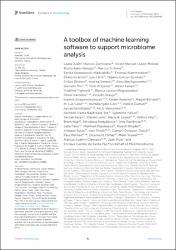| dc.contributor.author | Marcos-Zambrano, Laura Judith | |
| dc.contributor.author | López-Molina, Víctor Manuel | |
| dc.contributor.author | Bakir-Gungor, Burcu | |
| dc.contributor.author | Frohme, Marcus | |
| dc.contributor.author | Karaduzovic-Hadziabdic, Kanita | |
| dc.contributor.author | Klammsteiner, Thomas | |
| dc.contributor.author | Ibrahimi, Eliana | |
| dc.contributor.author | Lahti, Leo | |
| dc.contributor.author | Loncar-Turukalo, Tatjana | |
| dc.contributor.author | Dhamo, Xhilda | |
| dc.contributor.author | Simeon, Andrea | |
| dc.contributor.author | Nechyporenko, Alina | |
| dc.contributor.author | Pio, Gianvito | |
| dc.contributor.author | Przymus, Piotr | |
| dc.contributor.author | Sampri, Alexia | |
| dc.contributor.author | Trajkovik, Vladimir | |
| dc.contributor.author | Lacruz-Pleguezuelos, Blanca | |
| dc.contributor.author | Aasmets, Oliver | |
| dc.contributor.author | Araujo, Ricardo | |
| dc.contributor.author | Anagnostopoulos, Ioannis | |
| dc.contributor.author | Aydemir, Önder | |
| dc.contributor.author | Berland, Magali | |
| dc.contributor.author | Calle, M. Luz | |
| dc.contributor.author | Ceci, Michelangelo | |
| dc.contributor.author | Duman, Hatice | |
| dc.contributor.author | Gündoğdu, Aycan | |
| dc.contributor.author | Havulinna, Aki S. | |
| dc.contributor.author | Kaka Bra | |
| dc.contributor.author | Kardokh Hama Najib | |
| dc.contributor.author | Kalluci, Eglantina | |
| dc.contributor.author | Karav, Sercan | |
| dc.contributor.author | Lode, Daniel | |
| dc.contributor.author | Lopes, Marta B. | |
| dc.contributor.author | May, Patrick | |
| dc.contributor.author | Nap, Bram | |
| dc.contributor.author | Nedyalkova, Miroslava | |
| dc.contributor.author | Paciência, Inês | |
| dc.contributor.author | Pasic, Lejla | |
| dc.contributor.author | Pujolassos, Meritxell | |
| dc.contributor.author | Shigdel, Rajesh | |
| dc.contributor.author | Susín, Antonio | |
| dc.contributor.author | Thiele, Ines | |
| dc.contributor.author | Truică, Ciprian-Octavian | |
| dc.contributor.author | Wilmes, Paul | |
| dc.contributor.author | Yilmaz, Ercument | |
| dc.contributor.author | Yousef, Malik | |
| dc.contributor.author | Claesson, Marcus Joakim | |
| dc.contributor.author | Truu, Jaak | |
| dc.contributor.author | Carrillo de Santa Pau, Enrique | |
| dc.date.accessioned | 2024-04-15T08:43:51Z | |
| dc.date.available | 2024-04-15T08:43:51Z | |
| dc.date.issued | 2023 | en_US |
| dc.identifier.issn | 1664-302X | |
| dc.identifier.uri | https://doi.org/10.3389/fmicb.2023.1250806 | |
| dc.identifier.uri | https://hdl.handle.net/20.500.12573/2081 | |
| dc.description.abstract | The human microbiome has become an area of intense research due to its
potential impact on human health. However, the analysis and interpretation
of this data have proven to be challenging due to its complexity and high
dimensionality. Machine learning (ML) algorithms can process vast amounts
of data to uncover informative patterns and relationships within the data, even
with limited prior knowledge. Therefore, there has been a rapid growth in the
development of software specifically designed for the analysis and interpretation
of microbiome data using ML techniques. These software incorporate a wide
range of ML algorithms for clustering, classification, regression, or feature
selection, to identify microbial patterns and relationships within the data and
generate predictive models. This rapid development with a constant need for
new developments and integration of new features require efforts into compile,
catalog and classify these tools to create infrastructures and services with easy,
transparent, and trustable standards. Here we review the state-of-the-art for ML
tools applied in human microbiome studies, performed as part of the COST Action
ML4Microbiome activities. This scoping review focuses on ML based software
and framework resources currently available for the analysis of microbiome data
in humans. The aim is to support microbiologists and biomedical scientists to
go deeper into specialized resources that integrate ML techniques and facilitate
future benchmarking to create standards for the analysis of microbiome data.
The software resources are organized based on the type of analysis they were
developed for and the ML techniques they implement. A description of each
software with examples of usage is provided including comments about pitfalls
and lacks in the usage of software based on ML methods in relation to microbiome
data that need to be considered by developers and users. This review represents
an extensive compilation to date, offering valuable insights and guidance for
researchers interested in leveraging ML approaches for microbiome analysis | en_US |
| dc.description.sponsorship | T his study was supported by COST Action CA18131 “Statistical and machine learning techniques in human microbiome studies.” LM-Z is supported by Spanish State Research Agency Juan de la Cierva Grant IJC2019-042188-I (LM-Z). MB is supported by Metagenopolis grant ANR-11-DPBS-0001. MLC was partially supported by the Spanish Ministry of Economy, Industry and Competitiveness, Reference PID2019-104830RB-I00.
This article is based upon work from COST Action ML4Microbiome “Statistical and machine learning techniques in human microbiome studies,” CA18131, supported by COST (European Cooperation in Science and Technology), www.cost.eu. | en_US |
| dc.language.iso | eng | en_US |
| dc.publisher | Frontiers Media SA | en_US |
| dc.relation.isversionof | 10.3389/fmicb.2023.1250806 | en_US |
| dc.rights | info:eu-repo/semantics/openAccess | en_US |
| dc.subject | microbiome | en_US |
| dc.subject | machine learning | en_US |
| dc.subject | software | en_US |
| dc.subject | feature generation | en_US |
| dc.subject | feature analysis | en_US |
| dc.subject | data integration | en_US |
| dc.subject | microbial gene prediction | en_US |
| dc.subject | microbial metabolic modeling | en_US |
| dc.title | A toolbox of machine learning software to support microbiome analysis | en_US |
| dc.type | article | en_US |
| dc.contributor.department | AGÜ, Mühendislik Fakültesi, Bilgisayar Mühendisliği Bölümü | en_US |
| dc.contributor.authorID | 0000-0002-2272-6270 | en_US |
| dc.contributor.institutionauthor | Bakir-Gungor, Burcu | |
| dc.identifier.volume | 14 | en_US |
| dc.identifier.startpage | 1 | en_US |
| dc.identifier.endpage | 20 | en_US |
| dc.relation.journal | Frontiers in Microbiology | en_US |
| dc.relation.publicationcategory | Makale - Uluslararası Hakemli Dergi - Kurum Öğretim Elemanı | en_US |


















